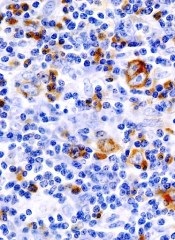
A novel agent has shown activity in relapsed or refractory Hodgkin lymphoma (HL), but it can cause severe adverse events and even death at a high dosage.
Researchers found that mocetinostat, an oral isotype-selective histone deacetylase inhibitor, was somewhat effective against HL when given at 85 mg or 110 mg.
However, patients in both treatment arms experienced adverse events, some of which led to treatment discontinuation. And 2 of the 4 deaths that occurred in the 110-mg arm could be attributed to treatment.
Anas Younes, MD, of M.D. Anderson Cancer Center in Houston, and his colleagues reported these results in the December print issue of The Lancet Oncology.
Dr Younes’s team began this study by enrolling 51 patients with relapsed or refractory classical HL who were 18 years of age or older. Patients received mocetinostat orally 3 times a week, in 28-day cycles.
Twenty-three patients received 110 mg of the drug, and 28 patients received 85 mg.
The study’s primary outcome was disease control rate. This was defined as complete response, partial response, or stable disease for at least 6 treatment cycles.
In the 110-mg arm, 35% of patients (8/23) met the disease control criteria. In the 85-mg arm, the disease control rate was 25% (7/28).
A total of 12 patients (24%) discontinued treatment due to adverse events. Nine patients discontinued in the 85-mg cohort, as did 3 patients in the 110-mg cohort.
The most frequent grade 3 and 4 adverse events were neutropenia, fatigue, and pneumonia. In the 110-mg arm, 4 patients experienced neutropenia, 5 reported fatigue, and 4 developed pneumonia. In the 85-mg group, 3 patients experienced neutropenia, 3 reported fatigue, and 2 developed pneumonia.
Four patients in the 110-mg arm died, and the researchers said 2 of these deaths may have been related to treatment.
The team therefore concluded that 85 mg of mocetinostat 3 times per week could be a promising treatment option for patients with relapsed or refractory HL.
The researchers received funding from the maker of mocetinostat, MethylGene Inc., of Montreal, Canada, as well as Celgene Corporation, of Summit, New Jersey.

